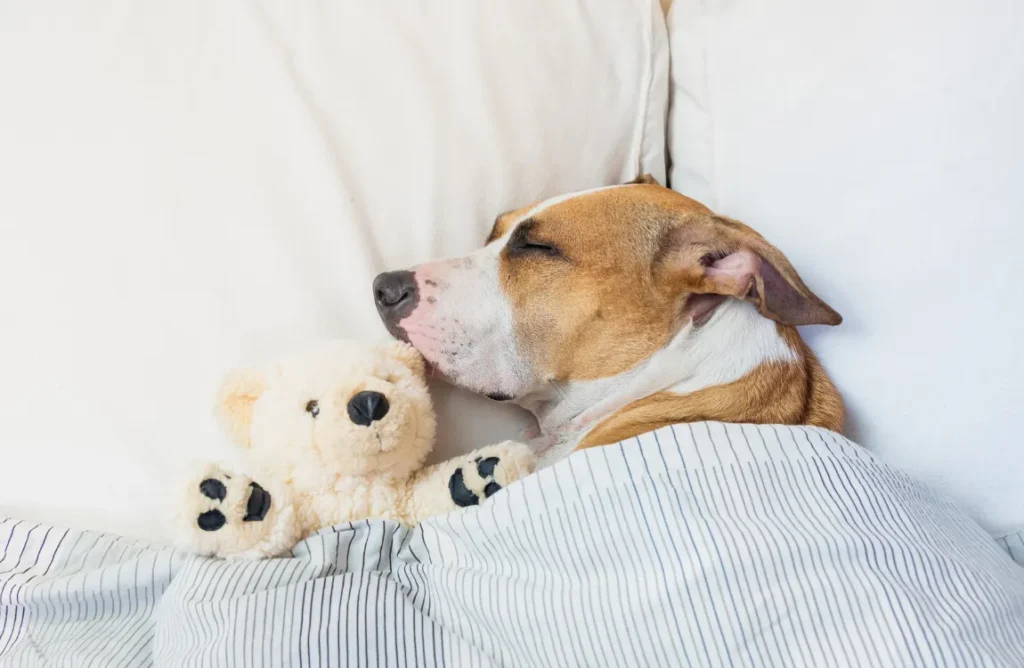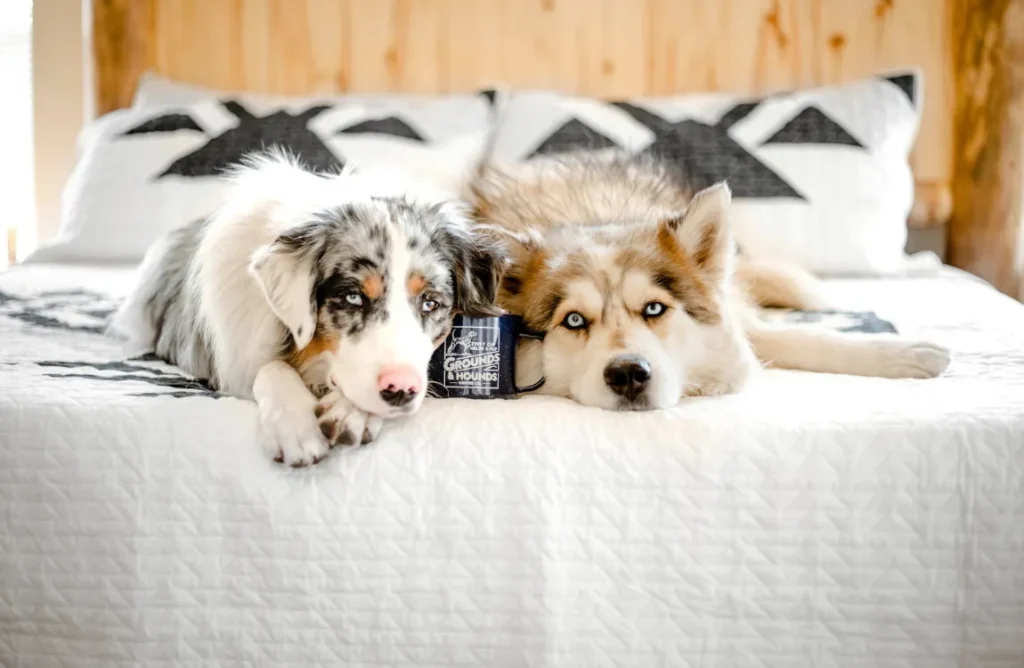Waking up to the unwelcome surprise of how to stop my dog from peeing on my bed has become a common frustration for many pet owners. In this guide, we tap into the collective wisdom of pet behavior specialists and dog trainers to provide actionable solutions. Addressing dog urination behavior and implementing puppy pee training guides, we aim to alleviate the stress associated with this messy problem, often by consulting a dog trainer.
Banish the midnight laundry sessions and reclaim the comforts of a clean and dry bedroom. By understanding the behavioral causes of dog incontinence and employing dog pee-proof solutions for beds, you can enjoy both cuddles and cleanliness. Stick around to learn how to stop your dog from peeing on your bed, ensuring peaceful nights ahead.
Why Is My Dog Peeing on My Bed?
The first step to tackling this issue is understanding why your dog may be exhibiting this behavior. Here are some possible reasons:
Territorial Marking:
Dogs have a natural instinct to mark their territory. If your dog is peeing on your bed, it could be their way of claiming ownership over the space. This behavior is more common in male dogs but can also occur in females.
Submissive Urination:
Some dogs may urinate on the bed as a submissive gesture when they feel intimidated or anxious. This is more likely to happen in younger dogs or those who have not been properly socialized, a situation that can cause dogs distress.
Anxiety:
Dogs can also exhibit inappropriate urination as a result of anxiety. Changes in their routine, separation from their owners, or other stressful situations can trigger this behavior.

Medical Issues:
In some cases, a dog may start peeing on the bed as a result of a medical issue such as a urinary tract infection or bladder stones, highlighting dogs with urinary problems.
It’s important to rule out any underlying health problems before addressing the behavior, especially in female dogs which might have unique health-related behaviors.
Lack of Housebreaking:
If your dog has not been properly housebroken, they may not understand that peeing on the bed is unacceptable. This can happen with puppies who are still learning or with new rescue dogs who have not been trained, particularly in young dogs.
Incontinence:
Older dogs or those with certain health conditions may experience incontinence, leading to accidents on the bed, highlighting the importance of understanding senior dog care. This can be due to weak bladder control or difficulty reaching the designated potty area.
How to Stop My Dog from Peeing on My Bed?
Now that we understand some of the reasons behind this behavior, let’s explore effective ways to stop it from happening. Here are some tips to help you prevent your dog from peeing on your bed and how to stop this behavior effectively:
Proper Potty Training:
If your dog is still learning where to go potty, it’s important to provide them with consistent and positive reinforcement. Take them out regularly and reward them for going potty in the designated area.
Clean Your Bedding with an Enzymatic Cleaner:
To prevent your dog from peeing on your bed again, it’s crucial to eliminate any lingering odor that may attract them back to the same spot, a key part of dog training. Use an enzymatic cleaner specifically designed for removing pet urine.

Manage Anxiety:
If your dog’s inappropriate urination is triggered by anxiety, it’s important to address the root cause of their stress.
This may involve behavior modification techniques or consulting with a professional trainer to catch your dog before the act becomes a habit.
Establish a Bathroom Schedule:
By establishing a consistent bathroom schedule for your dog, you can help them understand when and where it’s appropriate to go potty. Stick to the schedule as closely as possible and reward your dog for following it, a strategy advocated by dog trainers.
Provide Adequate Exercise:
A tired dog is less likely to exhibit anxious or destructive behaviors. Make sure your dog is getting enough exercise and mental stimulation to help them release any pent-up energy in a positive way.
How to Clean Dog Pee On the Bed:
If your dog has already had an accident on your bed, it’s important to clean it up properly to prevent any lingering odors. Here’s how to keep your dog engaged and correctly behaved:
Remove any excess dog urine:
Use paper towels or a clean cloth to blot the area and remove as much urine as possible.
Use an enzymatic cleaner:
As mentioned before, this type of enzymatic cleaner is specifically designed to break down the components of pet urine and eliminate any lingering smells that may attract your dog back to the same spot.
Wash your bedding:
If possible, remove and wash all affected bedding in hot water with a mild detergent to keep your dog from being attracted to the scent. Avoid using harsh chemicals as they may irritate your dog’s skin or respiratory system, and instead opt for solutions that keep your dog safe.
Air dry:
Allow your bedding to air dry completely before putting it back on the bed. This will help ensure that any remaining odors are eliminated, an essential step to stop peeing on your bed.
Consider using a waterproof cover:
If your dog is prone to accidents or you want extra protection, consider using a waterproof cover on your mattress and bedding to prevent dog pee on your bed. This can make clean up much easier in case of future accidents.
Conclusion:
Dealing with a dog that pees on the bed can be frustrating and stressful, but with proper understanding and training, you can address this issue effectively. Remember to rule out any underlying medical issues and provide your dog with consistent potty training and plenty of exercise.
By following these tips and using enzymatic cleaners, you can help prevent future accidents and enjoy peaceful nights with your furry friend. So don’t lose hope, with patience and the right approach, you can reclaim your bed as a pee-free zone. Now go cuddle up with your pup and enjoy a well-deserved good night’s sleep without worrying about dog pee on your bed! Sweet dreams!
Frequently Asked Questions:
How do I get my dog to stop peeing in my bed?
- -Rule out any underlying medical issues, especially those that cause dogs to lose control over their bladder.
- -Properly housebreak your dog and provide consistent potty training with the help of a dog trainer.
- -Clean up any accidents with an enzymatic cleaner.
- -Address any anxiety or stress triggers for your dog.
Should I punish my dog for peeing in my bed?
No, punishment is not an effective way to address this behavior. It may cause your dog to become more anxious or fearful, leading to more accidents, a challenge senior dog owners might face. Positive reinforcement and consistent training are key to addressing the issue.
How do I stop my dog from peeing in the house?
- -Establish a consistent potty schedule and reward your dog for going in the designated area.
- -Provide adequate exercise and mental stimulation for your dog to release excess energy.
- -Clean up any accidents promptly with an enzymatic cleaner to eliminate any lingering odors.
- -Consult with a professional trainer if necessary to address any underlying behavioral issues.
How do I get my dog to stop peeing at night?
- -Make sure your dog has gone potty before bedtime.
- -Limit water intake in the evening to reduce the chances of needing to go out during the night.
- -Consider crate training your dog, as most dogs will not want to pee where they sleep. However, make sure to give them enough time for bathroom breaks if needed.
Why does my dog pee on my bed?
There can be several reasons why a dog may pee on the bed, including medical issues, lack of proper potty training, anxiety or stress triggers, and territorial marking. It’s important to address the underlying cause in order to prevent this behavior from continuing and to stop peeing on your bed.
How can I stop my dog from peeing on my bed?
To stop your dog from peeing on your bed, it’s important to take a multi-faceted approach. First, make sure your dog is healthy by taking them to the vet for a check-up. If there are no medical issues, focus on house training and reinforcing good behavior. Take your dog outside frequently, especially after meals, naps, and playtime. Reward and praise your dog when they eliminate in the appropriate spot. .
What are some reasons why dogs pee on beds?
There are several reasons why dogs may pee on beds, including medical issues, lack of proper potty training, anxiety or stress triggers, and territorial marking. It’s important to address the underlying cause in order to prevent this behavior from continuing.
Can dog behavior training help stop my dog from peeing on the bed?
Yes, with the help of a professional trainer or behaviorist, dog behavior training can be effective in stopping your dog from peeing on the bed.
They can help identify underlying triggers and provide guidance on how to properly train and reinforce good behaviors in your dog.
